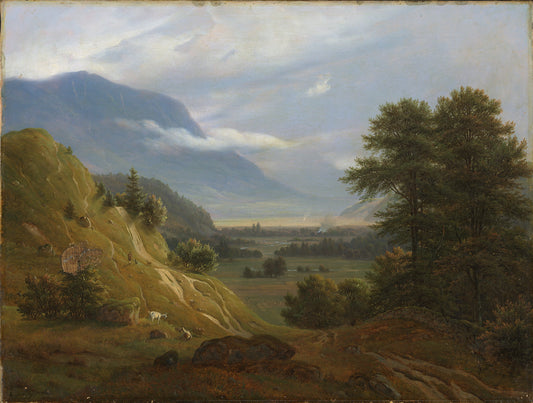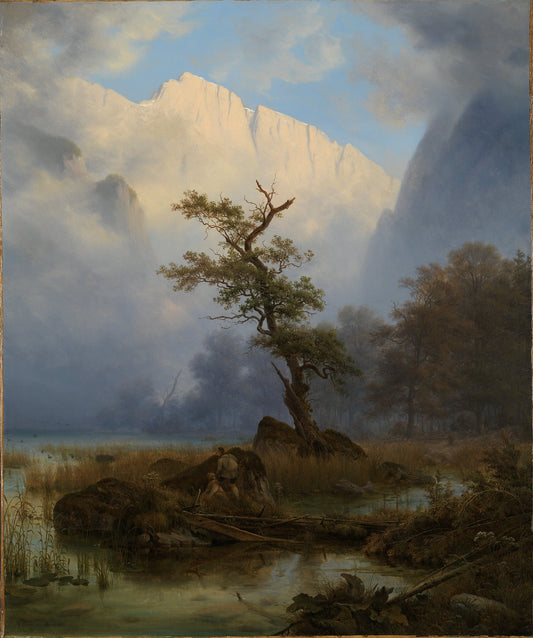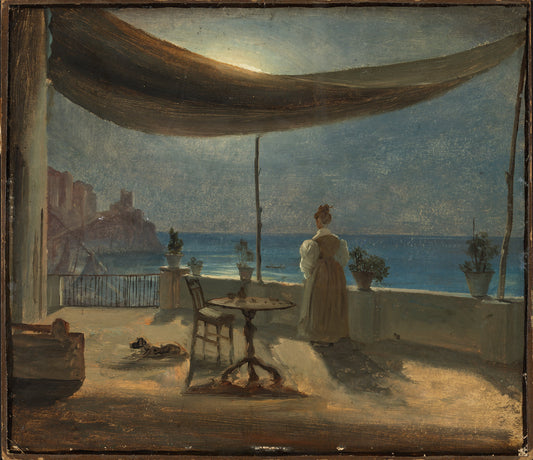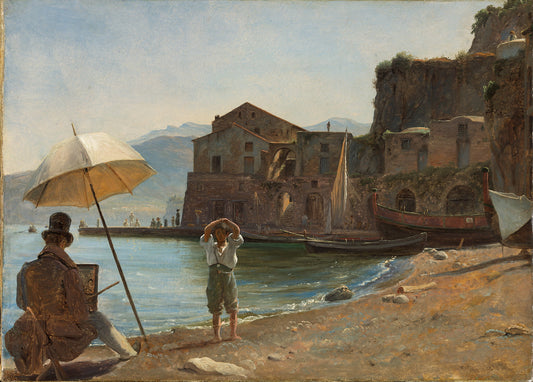Thomas Fearnley
From Grindelwald, Switzerland
From Grindelwald, Switzerland
Couldn't load pickup availability
High-quality reproductions with authentic colors and details from DAIDDA's exclusive collaboration with the National Museum. Posters are printed on 230g Litho White Matt photo paper with white border and logo. Artprints are printed on 260g Museum Natural Rag 100% cotton paper without white border and logo. Produced to order in our own print lab.
About the original: Among Thomas Fearnley's paintings with Swiss motifs, the Grindelwald glacier is the most significant. From a grassy hill in the foreground, we look up at the valley floor which is filled by a glacier. Nature observations made on the spot are edited into a magnificent composition. The pencil sketch drawn in August 1835, which is a starting point for the painting, shows a barren landscape in front of the glacier. The large trees, which make up such an important part of the picture as a whole, are based on tree studies done in Scheideck a week later.
In the painting, the artist has made the motif more dramatic than in the paper drawing. The mountain sides are steeper and are highlighted using light and shadow, while the clouds envelop some of the peaks in the background. The contrast to eternal ice and snow in the desolate valley stretch is enhanced by the lush foreground vegetation where the sheep graze under the supervision of the shepherd. The artist emphasizes the wild and inaccessible in nature by letting a bird of prey soar over the glacier. He allows himself a little joke by painting a fern tassel (English: Fearn) next to his signature.
It has been pointed out that the composition and the balanced direction of the landscape masses are reminiscent of the Düsseldorf painter Johann Wilhelm Schirmer (1807–1863), whom Fearnley met during his stay in Switzerland. The marked contrast between warm and cold colors was also perceived in romanticism as a symbol of the confrontation between life and death.
Before the painting was completed, it was exhibited at the Salon in Paris in 1836. Together with two paintings by JC Dahl, this and Fearnley's Labrofossen were the first paintings by Norwegian artists to be purchased by the National Gallery.
Date: 1835
Other titles: View from Grindelwald in Switzerland (ENG)
Designation:
Painting
Material and technique: Oil on cardboard glued on cardboard
Technique:
Oil
Material:
Cardboard sheet
Paper
Goal:
21 x 27 cm
Subject words:
Visual arts
Classification:
532 - Visual arts
Acquisition: Gift 1891 from the Association to the National Gallery's extension
Inventory no.: NG.M.00386
Registration level: Single object
Owner and collection: The National Museum of Art, Architecture and Design, Visual Art Collections
In the painting, the artist has made the motif more dramatic than in the paper drawing. The mountain sides are steeper and are highlighted using light and shadow, while the clouds envelop some of the peaks in the background. The contrast to eternal ice and snow in the desolate valley stretch is enhanced by the lush foreground vegetation where the sheep graze under the supervision of the shepherd. The artist emphasizes the wild and inaccessible in nature by letting a bird of prey soar over the glacier. He allows himself a little joke by painting a fern tassel (English: Fearn) next to his signature.
It has been pointed out that the composition and the balanced direction of the landscape masses are reminiscent of the Düsseldorf painter Johann Wilhelm Schirmer (1807–1863), whom Fearnley met during his stay in Switzerland. The marked contrast between warm and cold colors was also perceived in romanticism as a symbol of the confrontation between life and death.
Before the painting was completed, it was exhibited at the Salon in Paris in 1836. Together with two paintings by JC Dahl, this and Fearnley's Labrofossen were the first paintings by Norwegian artists to be purchased by the National Gallery. Date: 1835
Other titles: View from Grindelwald in Switzerland (ENG)
Designation:
Painting
Material and technique: Oil on cardboard glued on cardboard
Technique:
Oil
Material:
Cardboard sheet
Paper
Goal:
21 x 27 cm
Subject words:
Visual arts
Classification:
532 - Visual arts
Acquisition: Gift 1891 from the Association to the National Gallery's extension
Inventory no.: NG.M.00386
Registration level: Single object
Owner and collection: The National Museum of Art, Architecture and Design, Visual Art Collections
Shipping and returns
Shipping and returns
Shipping: We deliver to Scandinavia, the EU, the USA and several other countries. Please contact us if your country is not listed and we will try to arrange delivery.
Delivery time: 2-5 days within Norway, 7 days in Europe, 14 days globally.
Packaging: Our products are made to order and sent rolled in environmentally friendly packaging.
Customs Fees: International orders may be subject to customs fees, which are not included in shipping costs.
Return policy: You can return images within 14 days. See our returns page for more information.
Secure Payment: We never store your payment details. See our privacy policy for details.
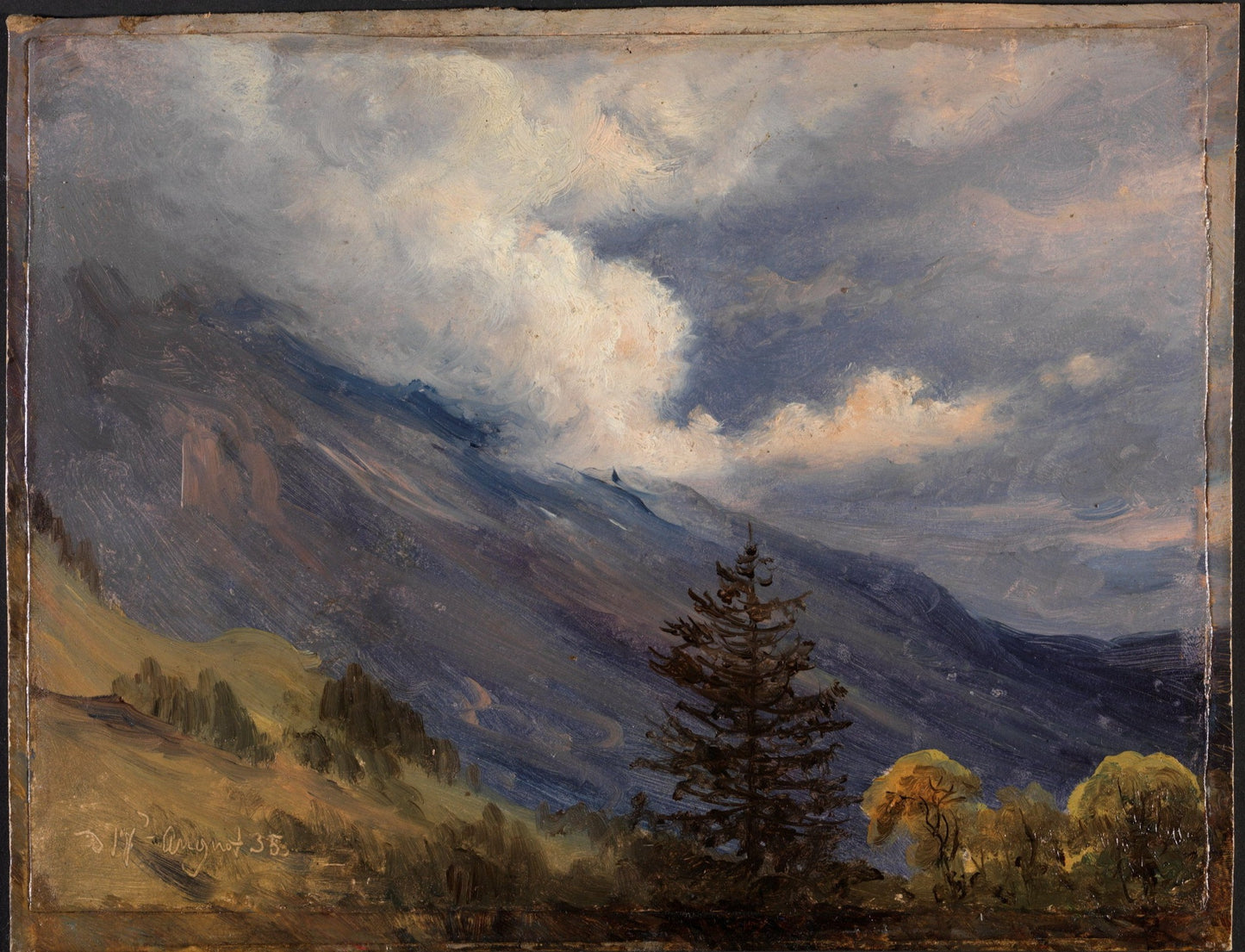
See all works
-
Landscape at Partenkirchen
Vendor:Thomas FearnleyRegular price From 150,00 NOKRegular priceUnit price per -
Duck hunting on an autumn morning at Königssee
Vendor:Thomas FearnleyRegular price From 150,00 NOKRegular priceUnit price per -
Moonlight at Amalfi
Vendor:Thomas FearnleyRegular price From 150,00 NOKRegular priceUnit price per -
The painter and the boy
Vendor:Thomas FearnleyRegular price From 150,00 NOKRegular priceUnit price per
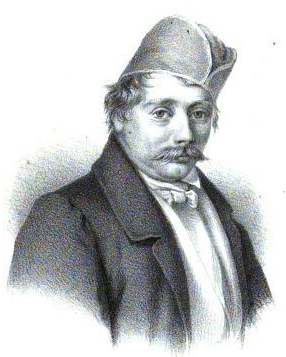
Thomas Fearnley
Thomas Fearnley was a Norwegian visual artist and painter born in Halden in 1802 and died in Munich, Germany in 1842. Although he only lived for 39 years, he left a significant mark on the history of art. In his large paintings, such as "Labrofossen" and "Grindelwald glacier", he took us closer to nature as he experienced it.
Fearnley was born in Halden, but moved to Christiania (Oslo) as a five-year-old to live with his aunt and uncle. He became a student at Krigsskolen, which was one of the few places in Norway that offered drawing lessons. However, he interrupted his military training due to concentration difficulties. At the age of seventeen, he began taking evening classes at the newly founded Art School, while working in his uncle's shop during the day. At the Drawing School's first exhibition in 1820, two of Fearnley's pictures were exhibited. Norway's magnificent nature was "discovered", and the young Thomas Fearnley was in the middle of the sensation. After a few years of study at the Academy of Fine Arts in Copenhagen, Fearnley moved to Stockholm where he received important commissions from the royal household. In the summer of 1824, he went on his first study trip in Norway to Telemark. Fearnley had many colleagues, friends and supporters in an international art community.
During his short life he was constantly on the move. He has therefore been called "the European" in Norwegian art. Together with a couple of artist friends, he set out on foot from Munich and across the Alps to Italy in 1832. It was a cold and wet trip, and one of his traveling companions, the Danish painter Wilhelm Bendz, died of pneumonia shortly after arriving in Italy. Fearnley stayed in Italy for over two years, and in his drawings and oil studies we can see how he became a master of rendering light and shadow. On the return trip he found what was to become one of his main motifs: the Upper Grindelwald Glacier in the Bernese Alps in Switzerland. Thomas Fearnley is referred to as a person with good humor and a big heart. He died in January 1842 of typhoid fever, leaving a young widow and a son barely 9 months old.


